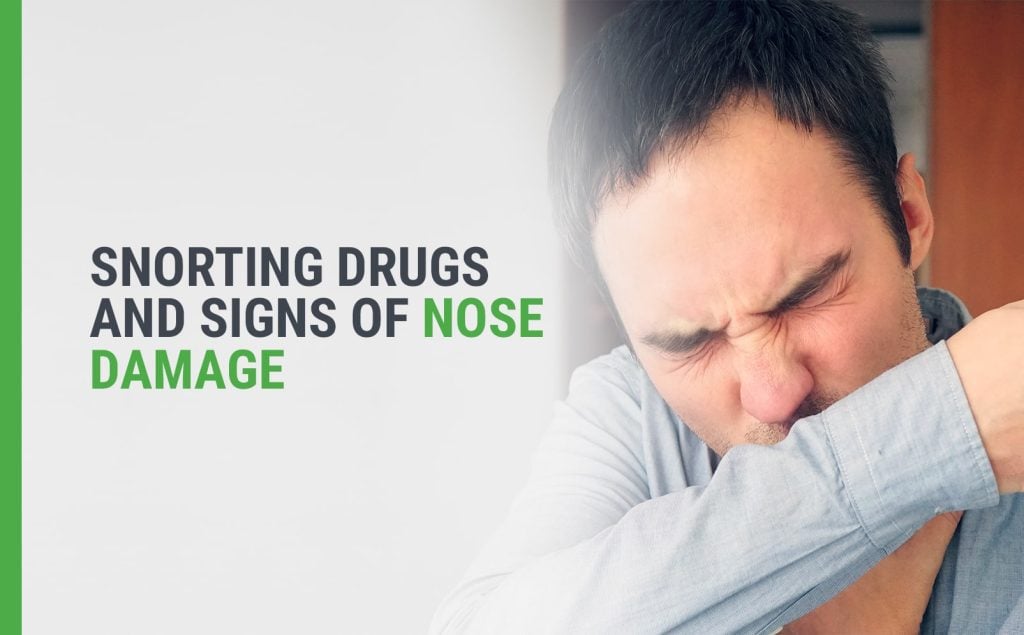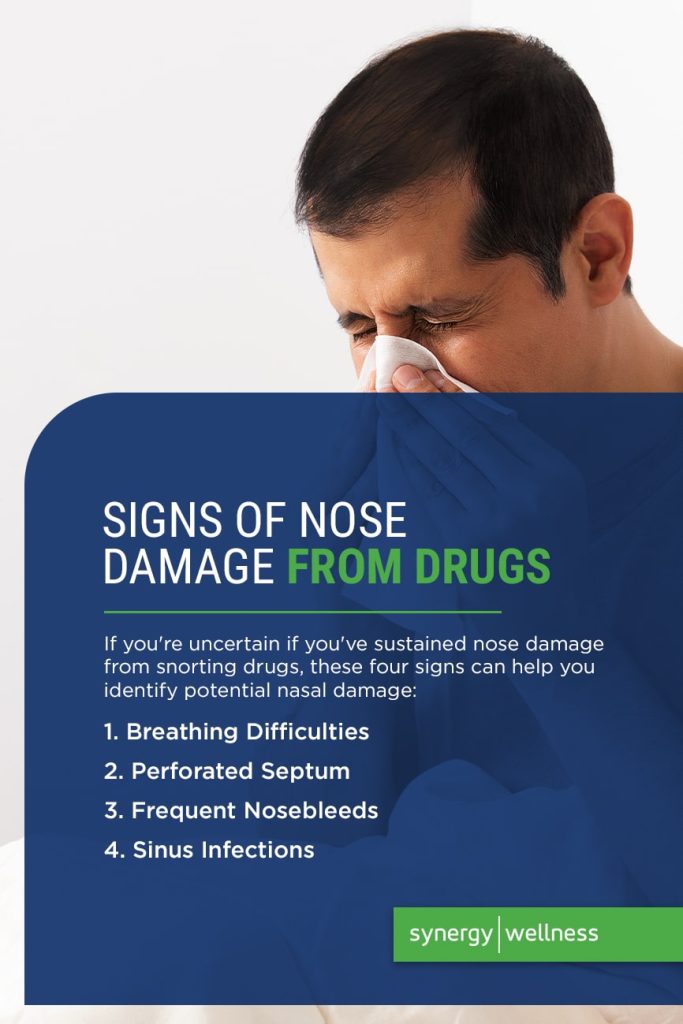
There are many ways to administer drugs and experience their effects. People with a substance use disorder take drugs orally, through smoking and injection, or they can choose to snort the substance. Snorting drugs refers to the act of inhaling a powdered substance through the nasal cavity to achieve a high and the desired effects of a particular substance.
Snorting drugs can compound the various adverse effects of substance abuse. Below, we’ll explain why people snort drugs, nose damage from snorting drugs and how you can treat the damage.
Why Do People Snort Drugs?
People most often snort cocaine, but other drugs can be crushed and snorted, including opioids, ketamine and fentanyl. People snort drugs because it delivers the substance more quickly to the bloodstream than through ingestion. When you swallow a pill, the drug has to be broken down by the stomach before being absorbed into the stomach lining or intestines and delivered to the bloodstream. The mucous membranes in the nose facilitate quick delivery to the brain, allowing a person to feel the effects of a drug sooner.
Snorting drugs is often a sign that an addiction is forming. In the case of opioids or other pills, a person may have built up a tolerance and start crushing their pills and snorting the powder to intensify the effects and deliver it to their system more quickly. They’re looking for an immediate high, whether it’s for pain relief or a sense of euphoria.
There’s a misconception that snorting prescription drugs is safer than street drugs, but this isn’t the reality. Prescription drugs are specifically formulated to be administered one way, usually in pill form. These medications are meant to be broken down by the stomach, slowly absorbed into the bloodstream. Snorting prescription drugs releases the effects of the medicine almost immediately, which can have various adverse effects on the body, not to mention the damage it can do to a person’s nasal cavity.
Snorting drugs can potentially lead to further drug use and alternative delivery methods. Since snorting drugs deliver the substance to the bloodstream quickly and amplify the effects of the drug, a person may start to use more of a substance to chase the high. For example, when you snort cocaine, the effects last for 15 to 30 minutes. Once the effects wear off, a person may feel sad or fatigued. A person may start using the substance more frequently to chase the high.
Once a person becomes accustomed to snorting drugs, they might start looking for different administration methods to deliver the substance to the bloodstream more quickly, such as injections. Injections can pose an even more significant threat to a person’s health and open the door to other dangerous substances.

What Happens When Cocaine Is Snorted?
When a person snorts cocaine, the substance finds its way past the mucous membrane and into the blood vessels. The substance travels through the body and past the blood-brain barrier (BBB). The BBB separates blood from your brain fluid and the central nervous system. Once cocaine has passed the BBB, it affects the central nervous system.
Cocaine stimulates dopamine production in the brain and blocks dopamine receptors, causing an excess build-up of dopamine. Dopamine is responsible for pleasure and functions as our reward system, triggering a feel-good response for something rewarding, such as delicious food or exercise. When too much dopamine is present due to cocaine use, the body experiences a euphoric high.
Cocaine also interrupts the communication process with the rest of the central nervous system, causing various effects, including:
- Dilated pupils
- Accelerated heart rate
- High energy
- High body temperature
- High blood pressure
- Nausea
- Tremors
- Restlessness
- Lack of appetite
- Hallucinations or paranoia
Even a single dose of cocaine can alter your brain’s reward center, making it easier to become addicted. Once the brain’s reward center is affected, a person may continue using cocaine to achieve the euphoric high, leaving them vulnerable to the long-term effects of cocaine abuse and substance use disorders.
Short-Term Effects of Snorting Drugs
Though some people choose to snort drugs to increase the effects of certain substances and the speed of onset, the nose was not meant to inhale powders, no matter how fine. When a person snorts drugs, the nasal cavity can become damaged, even from a single dose.
The damage isn’t always caused by the drug itself but by other additives, such as talcum powder, boric acid and laxatives. These foreign substances cause inflammation in the nose, which can lead to short-term effects such as:
- Swelling of the inner lining of the nose
- Infection in the nasal cavity and lungs
- Nasal blockages and a runny nose
- Breathing difficulties
- Discomfort or pain
- Nosebleeds
- Blistering in the nasal cavity
These effects can occur from a single use. They’re often minor and usually clear up on their own within a few hours or a full day. Infections may need antibiotic treatment from a physician but will often improve with the proper treatment. Depending on what drugs you’re using, there are other possible effects.
For example, if you’re snorting cocaine, you’ll likely experience a sense of euphoria, excess energy, restlessness and tremors. If you’re snorting opioids, you might experience drowsiness, confusion or slowed breathing.
When you snort any drug, you’re enhancing its effects and bypassing its delayed time release. You’ll feel the effects sooner, but they’ll be more intense. The potential for overdose is also increased, as well as the risk of addiction.

What Is Cocaine Nose?
Cocaine nose is an informal term used to describe the nose-related problems caused by cocaine use. Cocaine constricts the blood vessels in the nose, causing them to get tighter and smaller. Blood flow is reduced to the blood vessels exposed to cocaine. Cocaine use can decrease circulation, where nose tissue and cells become fragile and can potentially die. When these tissues are vulnerable, the nose can experience internal damage, despite appearing fine outside.
Cocaine nose can cause long-term damage and cosmetic effects. These conditions usually occur gradually. In the first stages, a person may damage their nasal cavity but experience few symptoms. As cocaine use continues, more severe side effects can appear. The longer a person snorts cocaine, the more likely it is for the damage to become permanent.
Long-Term Effects of Snorting Drugs
While the nasal cavity can become damaged from a single instance of drug use, snorting drugs long-term can have severe health effects. The primary damage is to the nose itself. Repeated snorting of drugs can cause inflammation, ischemia — where a part of your body doesn’t get enough blood — and infections.
Long-term cocaine use can also lead to perforations of the nasal septum and even perforations on the roof of the mouth, which can cause challenges with swallowing. The holes in the septum can cause cosmetic effects, and in severe cases, the entire septum can go missing due to being eaten away by the drug.
Many people don’t often notice perforations of the nasal septum until a doctor examines them or the damage becomes so severe that it starts to impact their daily life. Even with a nasal perforation, a person may continue to use cocaine since the substance has altered the brain’s reward system and cognitive functioning, leading to poor judgment and addiction.
Another effect of long-term cocaine use is the weakening of the nasal valve through repeated infection and irritation. The nasal cavity can collapse, and a person may experience atrophy and necrosis, or cell death, in the mucous membranes in the nose.
Long-term effects from snorting drugs also include:
- Loss of smell: The irritation and damage can cause you to lose your sense of smell, which can create various hazards. You may not be able to smell when food has gone rotten or when a gas leak occurs in your home, potentially putting your life in danger.
- Nasal cosmetic changes: Nasal changes caused by nasal septum perforations or a nasal cavity collapse can alter the appearance of your face, requiring medical intervention.
- Worsening allergies: When your nasal cavity is irritated from snorting drugs, you’re more vulnerable to other irritants and allergens. You may experience worsening allergy symptoms such as a runny nose, sneezing, coughing or difficulty breathing.
- Snoring: When your nasal cavity becomes damaged, you’re more likely to snore, which can cause additional irritation, inflammation and damage. When you snore, your sleep cycle is also disturbed, meaning you might wake up feeling less rested or tossing and turning through the night to breathe correctly.
- Dryness: When you’re snorting drugs, the mucous membrane in your naval cavity dries out. Without the moisture to protect your nasal cavity, you’re more prone to infection, irritation and nosebleeds.
Snorting drugs also has the potential to cause a brain aneurysm. When you snort a substance, the blood vessels constrict and increase your blood pressure. High blood pressure can cause small tears within the blood vessels. In most cases, these blood vessels will heal on their own, but if they don’t, the walls of the blood vessel will become thin and have trouble maintaining a stable pressure. A weakened vessel can bulge and cause a brain aneurysm.
The symptoms of a brain aneurysm include:
- Double or altered vision
- One dilated pupil
- Pain or tension behind the eyes
- Numbness on one side of the face
A brain aneurysm is a medical emergency and should receive immediate medical attention. You can help prevent the formation of a brain aneurysm by seeking treatment for substance abuse and eliminating substances from your lifestyle.

Signs of Nose Damage From Drugs
Inhaling drugs can cause various health complications, even from a single dose. Long-term use can cause more severe health problems that require medical intervention. If you’re uncertain if you’ve sustained nose damage from snorting drugs, these four signs can help you identify potential nasal damage:
1. Breathing Difficulties
Cocaine use can cause breathing difficulties, and people who use this drug are at a higher risk for asthma, pneumonia and chronic obstructive pulmonary disease (COPD). Cocaine and other drugs can also damage the lungs and cause infections, creating additional breathing difficulties. Chronic airway damage can occur, leading to a collapsed lung, bleeding in the lungs and other complications.
2. Perforated Septum
Most common among cocaine addicts, a perforated septum is a hole in the nose that can cause breathing problems, discomfort, pain or chronic infections. If the damage is severe enough, the septum won’t be able to provide adequate support, and the naval valve can collapse, causing further complications. It can be challenging to spot a perforated septum before the damage becomes severe, so getting regular checkups with your physician is essential.
3. Frequent Nosebleeds
When the blood vessels in the nose become irritated, inflamed or damaged from drug use, it can cause a runny nose or frequent nosebleeds. People who use cocaine often experience these symptoms since cocaine constricts the blood vessels and alters bleeding patterns.
4. Sinus Infections
Snorting drugs increases the risk of sinus infections due to irritation of the nose and sinuses. A severe sinus infection can spread and cause damage to other parts of the body. Necrotizing sinusitis, a type of sinus infection, can spread quickly, killing various cells and damaging the nasal cavity and surrounding structures. Sinus infections can even damage the eyes. If you don’t seek treatment for severe sinus infections, they can be fatal.
How Is Coke Nose Damage Treated?
Snorting cocaine or other drugs can cause irritation and other types of damage. There are methods you can use to soothe the irritation and potentially improve your symptoms, including:
- Vaseline or petroleum jelly: Petroleum jelly protects dry skin and locks in moisture, creating a barrier between the skin and outside irritants. You can apply it by putting a small amount on the tip of your finger and placing it around the edge of your nostril. You can also apply petroleum jelly just on the inside of your nose, but avoid going any further.
- Saline rinse: Snorting cocaine or another drug allows it to rest on the mucous membrane in your nose for a few minutes, causing irritation and damage. You can rinse your nose with saline to clear away all irritants, and pat the nose dry since wet skin can become more easily irritated.
- Vitamin E: Vitamin E oil can help replenish moisture and protect your nose from irritants. If you don’t have petroleum jelly on hand, vitamin E can be a suitable alternative.
If you have cosmetic damage from cocaine or drug use, plastic surgery is an option to restore the natural appearance of your nose. Stopping cocaine use or use of other substances can also prevent further damage and potentially allow the nasal cavity to heal independently.
Recovery for Cocaine Addiction in Bakersfield, CA
If you or a loved one is struggling with addiction, you’re not alone. The professional staff at Synergy Recovery can help you overcome addiction and improve your quality of life. We treat cocaine addiction as well as various other substance use disorders. We utilize medication-assisted treatment combined with therapeutic clinical practices to aid your recovery process.
Our treatment programs are personalized for your individual circumstances to address your specific addiction and treat the underlying cause. Contact us today to learn more about our treatment programs and how we can help you improve your physical, mental, and emotional health.




